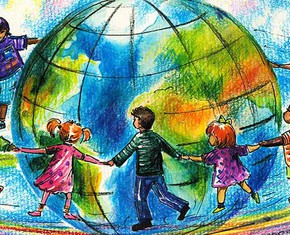The views expressed in our content reflect individual perspectives and do not represent the authoritative views of the Baha'i Faith.
Baha’u’llah taught that hearts must receive the Bounty of the Holy Spirit, so that Spiritual civilization may be established. For material civilization is not adequate for the needs of mankind and cannot be the cause of its happiness. Material civilization is like the body and spiritual civilization is like the soul. Body without soul cannot live. – Abdu’l-Baha, Abdu’l-Baha in London, p. 30.
The World Happiness Report, a landmark global survey of the state of global happiness, debuted in 2012. Recently, leading experts in public policy, psychology, economics and health released the World Happiness Report 2016 Update, which describes how measurements of well-being can effectively assess the progress of nations, based on the relative happiness of their people.
This latest Report reviews the state of happiness in the world today, and shows how the new science of happiness explains personal and national variations in happiness. The Report, along with its findings on human happiness in most of the planet’s countries, reflects a new worldwide demand for more attention to happiness as a criteria for government policy and social progress.
Survey respondents in 156 countries evaluated the current state of their lives along a ladder-based scale, where 0 represents the worst possible life and 10, the best possible.
Researchers who conducted the survey scientifically weighed, measured and compared six separate key variables in their evaluation of the results: GDP per capita; healthy years of life expectancy; social support (as measured by having someone to count on in times of trouble); trust (as measured by a perceived absence of corruption in government and business); perceived freedom to make life decisions; and generosity (as measured by recent donations to charity).

These happiness factors, as measured by life evaluations, provide a broader indicator of human welfare than do measures of income, poverty, health, education, and good government viewed separately.
Pollsters also asked a question about the extent to which the respondents felt they had a purpose or meaning in their lives. That question—a way to measure spiritual happiness—has come to be called “eudaimonic,” in honor of Aristotle, who coined the term “eudaimonia,” which means “human flourishing,” or “good spirit.” Aristotle believed that having such a purpose is central to any reflective individual’s assessment of the quality of his or her own life.
This year’s World Happiness Report came to several fascinating conclusions. The first one, from a spiritual perspective, has to do with positive human emotions—love, trust, caring, etc. The report concludes that people who report having those kinds of positive emotions or “affect” also have strikingly higher scores in the self-evaluation of their lives. They tend, by a large margin, to report much higher positions on the Cantril “best possible life” ladder. In general, they’re much happier people.
Those who report having a preponderance of negative emotions, on the contrary, tend to rank life ladder scores lower. The Report concludes that these findings uphold:
…the Aristotelian presumption that sustained positive emotions are important supports for a good life. The most striking feature is the extent to which the results buttress a finding in psychology, that the existence of positive emotions matters much more than the absence of negative ones. Positive affect has a large and highly significant impact in the final equation, …while negative affect has none. – World Happiness Report 2016
“Sustained positive emotions” and a sense of inner meaning and purpose, the report says, can actually help create a good life. From a Baha’i perspective, that conclusion resonates perfectly with Abdu’l-Baha’s descriptions of what makes us happiest:
Material progress insures the happiness of the human world. Spiritual progress insures the happiness and eternal continuance of the soul. – Abdu’l-Baha, Foundations of World Unity, p. 85.
…man’s supreme honor and real happiness lie in self-respect, in high resolves and noble purposes, in integrity and moral quality, in immaculacy of mind. – Abdu’l-Baha, The Secret of Divine Civilization, p. 18.
When love is realized and the ideal spiritual bonds unite the hearts of men, the whole human race will be uplifted, the world will continually grow more spiritual and radiant and the happiness and tranquillity of mankind be immeasurably increased. Warfare and strife will be uprooted, disagreement and dissension pass away and universal peace unite the nations and peoples of the world. All mankind will dwell together as one family, blend as the waves of one sea, shine as stars of one firmament and appear as fruits of the same tree. This is the happiness and felicity of humankind. – Abdu’l-Baha, Foundations of World Unity, p. 19.
Wealth, fame and success, many research studies have found, don’t create happiness—love does. In the Harvard Study of Adult Development, which has tracked and evaluated the lives of more than 700 men, their spouses and children since 1938, researchers have concluded that strong relationships, with not only spouses but with friends, protected people against memory decline, chronic illness and mental disorders—and had an enormous impact on lasting happiness.
Those “ideal spiritual bonds” that “unite the hearts of men,” the Baha’i teachings promise, not only lead to our own individual happiness, but to the happiness and tranquility of humanity itself.
Next: Can Money Make You Happy?
You May Also Like
Comments

















I especially like the way, you connect religion with science.
Ich wish you a most happy life
Ingrid Strom, 88131 Lindau, Germany